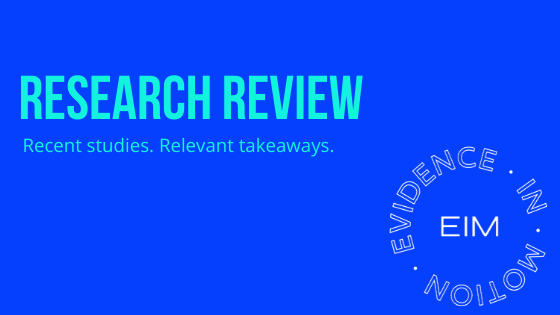
Pain Neuroscience Education for Depression: A Pilot Study
Adriaan Louw, PT, PhD led a team of researchers in this groundbreaking research checking if pain neuroscience education (PNE) can alter depression. The study showed PNE can lower depression and shift patients from higher levels of depression to lower levels.
Abstract
Objective: To determine if a brief, one-on-one pain neuroscience education (PNE) session delivered by a physical therapist (PT) can influence depression.
Methods: A convenience sample of patients with persistent low back pain (LBP) (n = 23) attending PT with moderate to severe depression (Patient Health Questionnaire-9 [PHQ-9]) participated in the study. Patients received a standardized, one-on-one 30-minute PNE session by a PT with pre- and post-intervention measures of low back and leg pain (Numeric Pain Rating Scale [NPRS]), pain catastrophization (Pain Catastrophization Scale [PCS]), pain knowledge (Revised Neurophysiology of Pain Questionnaire [rNPQ] and depression (PHQ-9).
Results: Immediately following PNE, all measures improved, with low back and leg pain not being significant (pback = 0.345 and pleg = 0.633), while pain catastrophization (p = 0.047), pain knowledge (p = 0.001) and depression (p = 0.004) reaching significant improvements. The PNE session shifted various patients to lower levels of depression, with 21.8% of the patients’ improvement in depression meeting or exceeding the minimal clinical important difference.
Conclusion: PNE may be a safe, clinically effective way to help a subgroup of patients attending PT with depression. More studies are needed to further explore the results from this pilot study.
Depression and patients attending outpatient physical therapy with musculoskeletal pain and disability
This study from Adriaan Louw, PT, PhD and a team of researchers shows that one in seven patients attending PT present with moderate to severe depression. Furthermore, the study shows that being disabled, having personal injury insurance and high BMI is correlated with higher depression scores, while more sleep and exercise is associated with lower depression.
Abstract
Background: Depression is very prevalent and a comorbidity in musculoskeletal pain. Physical therapists treat high volumes of patients with musculoskeletal pain, thus warranting a need to screen patients for depression for safety and proper treatment. The aim of this study was to screen patients attending outpatient physical therapy for depression and determine what variables predict the presence of depression.
Patients and methods: A convenience sample of patients attending outpatient physical therapy for musculoskeletal pain was asked to complete a survey consisting of demographic information and the Patient Health Questionnairre-9 (PHQ-9), nine-item depression scale.
Results: The patient sample consisted of 320 patients with a mean age of 52.36 (±16.78) years with a mean duration of pain of 5.89 (±6.69) months. Mean PHQ-9 score at intake was 5.37±4.84) with 14.1% of the patients classified as moderate to severe depression. The variables most associated with a high PHQ-9 score were being disabled (β = 4.26, p = 0.01), having personal injury insurance (β = 4.04, p = 0.12) and a high body-mass index (β = 3.75, p = 0.30). Lower PHQ-9 scores were associated with getting more sleep (β = -0.76, p = 0.02) and higher minutes of exercise per week (β = -0.004, p = 0.25).
Conclusions: Approximately one in seven patients attending outpatient PT for musculoskeletal pain present with moderate to severe depression. Various patient characteristics were identified that may indicate a higher likelihood of clinical depression, which may aid in the identification of depression in patients with musculoskeletal pain. Additional research is needed to validate these preliminary findings from this study.